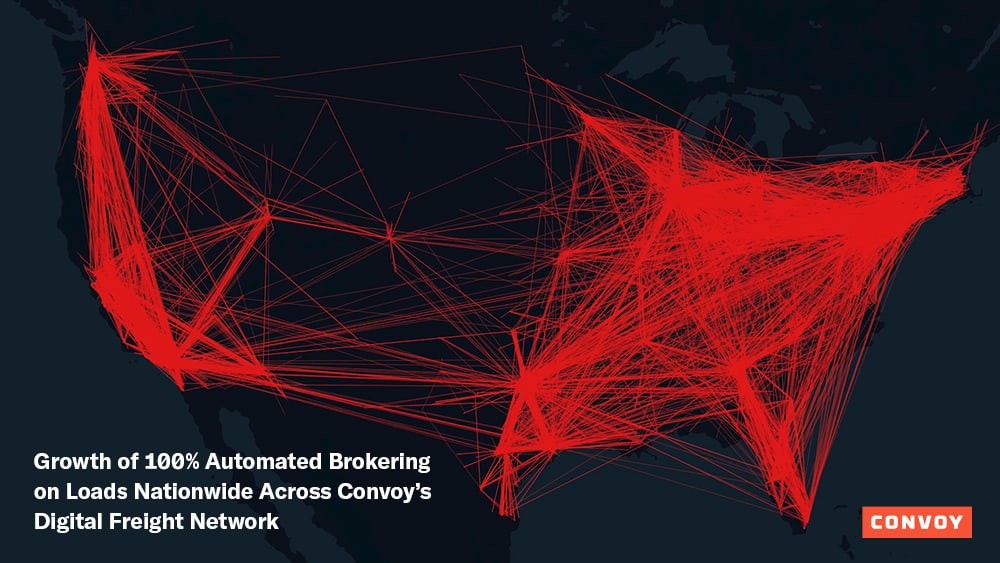Ziad Ismail, Convoy’s chief product officer, told FreightWaves in February that the automation of pricing and load matching were two separate problems. At the time, Convoy was solving for the first – load matching. Now the company has announced it has solved the second.
Convoy said on Dec. 18 that it is now automating 100% of brokered loads in top freight markets and that the automation process is growing in markets across the country. Atlanta, Boston, Dallas and Los Angeles are among the areas where Convoy is automating 100% of pricing and load matching.
“Up until this point, we have had some human involvement in setting these prices, and sometimes a driver would call into a brokerage team to get the right rate,” Ismail told FreightWaves.
In select markets, the entire process of moving freight is now automated. In February, Convoy began matching loads automatically, which is now happening in 98% of the country. The process takes a tendered load and algorithms identify available trucks in the Convoy network and as bids are accepted or rejected, the system analyzes the process and makes adjustments as necessary to improve the chances the shipment is accepted.
The addition of the automated brokering component further streamlines the process and drives greater efficiency for every party involved in the transaction, Ismail said.
“We think this is the future of the brokering model, not only that it is automated but that the heart of it is a computer science model,” he said, adding that existing Convoy brokers are working on new markets and opportunities so there hasn’t been a displacement of workers. “What we are seeing is that this is going to happen in the industry as well. And we think that as you build a more efficient model, it’s going to shift the work.”

Convoy’s machine-learning algorithms manage the entire process, from setting rates to helping connect those loads to carriers. As always, a carrier has the option of whether to take a load, and if loads are repeatedly rejected, the algorithm will adjust the rate, which can save hours or even days from the current manual process of negotiating rates to get shipments moved.
“This breakthrough on automated platform pricing by Convoy on high-density cargo lanes is significant and definitive towards achieving a future of truly automated touch-of-a-single-button-type brokering,” said Silpa Paul, team lead of commercial vehicle research and consulting at Frost and Sullivan. “Digital freight providers have been around for years, but where they have struggled is precisely in automating pricing. Most have had to create a system of customer account executives with call support to actually complete the brokerage process. Thus, they have been operating more or less like traditional brokers.”
It’s important to note that the process does not lower rates for carriers or raise rates for shippers, he said.
“Convoy works with shippers and we agree … which freight we are going to take for them, and then it’s up to Convoy to find the right driver for this work and what’s the right price for that work,” Ismail said. “Our models need to learn how the prices are changing so we can [set the right price].”
Ismail said with more than 15,000 brokers in the U.S., it’s impossible for any single company to set the market rate for carriers, which is why Convoy is focused on building tools that help all parties – brokers, carriers and shippers – work more efficiently. He pointed to the Automated Reloads program as an example.
Automated Reloads presents drivers with a package of loads with a single price that take into consideration criteria such as the carriers’ lane preferences, driver hours-of-service availability, driver locations and facility wait times. The idea is to provide carriers with multiple options so they don’t have to spend time looking for backhauls.
“Automating this process doesn’t reduce the rates that carriers are getting for the jobs,” Ismail said. “The thing it is doing is making it a lot easier and a lot faster for them to get the work they need. This work is really about reducing the hassle of drivers and helping them.”
The data science behind the automation of pricing as well as load matching will drive additional efficiencies for the supply chain, Ismail said.
“There will be a shift away from doing the mundane tasks,” he noted. “I think we’ll see the work move to things that are more [difficult] that only humans can do well. Things that are pure data science problems are going to be automated.”
The expectation is that through automation shippers will achieve better cost control and carriers will be able to search, select and deliver loads more efficiently, freeing up time and resources for additional loads or other cost savings.
This article is published jointly with our partners at Convoy. To view more Future of Freight content, click here.










